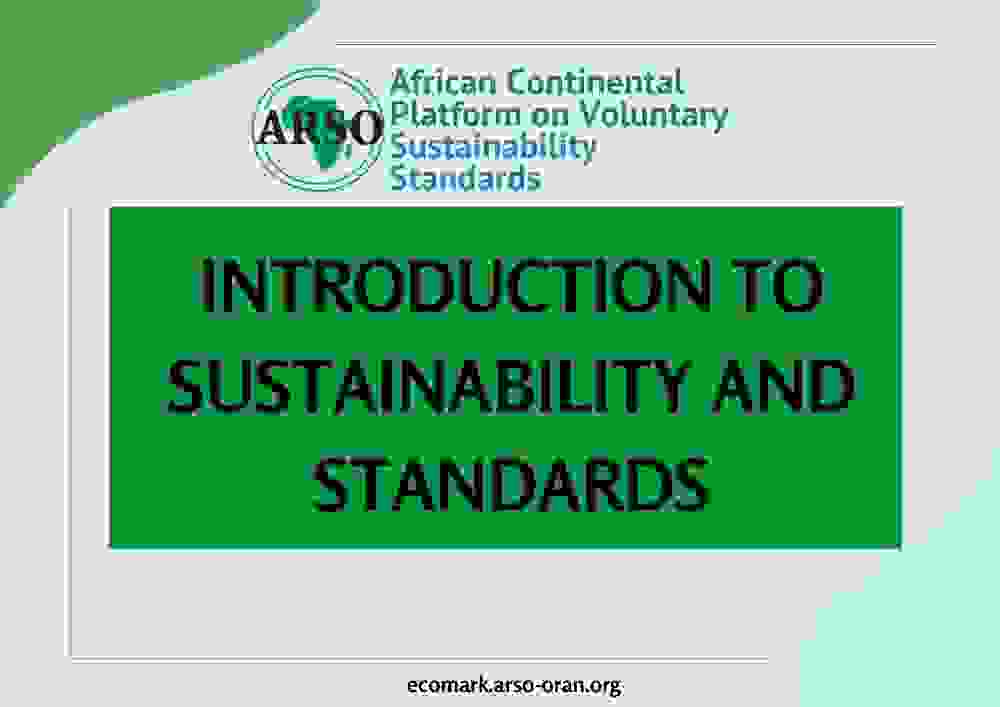Trending
Introduction to Sustainability and Standards
- Authored By ARSO (African Organisation for Standardisation)
- 7 Chapters
- 11 Student Enrolled
Course Overview
Primary Interest:
- Knowledge Transfer on the Implementation of Sustainability Standards to SME’s in the Agriculture, Aquaculture, Forestry and Tourism Sectors to improve their productivity and bringing to the market cleaner and more energy-efficient products, helping protect and conserve environmental resources.
Secondary:
- Governmental agencies
- National standardization bodies
- African Regional Economic Communities (RECs)
- Representatives from private sector industries
- Civil Society
- Academia
CONTEXT
Why offer the training:
- To facilitate intra-Africa trade
- Opportunity to educate and influence change
- Understand the challenges that impact the acceptability of product, trade and competitiveness / and solutions thereof
- Enhance quality and safety products
MODULE DESCRIPTION
Sustainability Standards and the ACAP
- ACAP Rules and African Ecolabelling Standards Rules
- Introduction to Sustainability - Why and What?
- ILO Conventions and Labour Rights
- ACAP / AES ECOLABELLING Certification Standards - Agriculture
- ACAP / AES ECOLABELLING Certification Standards - Tourism
- ACAP / AES ECOLABELLING Certification Standards - Aquaculture
- ACAP / AES ECOLABELLING Certification Standards - Forestry
Course Curriculum
Primary Interest:
• SME’s in the Agriculture and Food Sector dealing with Agro-processing and having an interest in exporting their product to a wider African Market and even globally
Packaging plays an important role in containing, protecting and preserving food from farm to fork and hence an essential component to Agro-processing. Researchers have shown that the use of appropriate packaging contributes to reducing food losses and waste, and maintenance of product quality and safety. Packaging fulfils a broad spectrum of requirements all being related to the preservation of food quality and the proper presentation and handling of the food item
The Quality components of Agro-produce as provided by Pons and Sirvardiere are related to:Produce Characteristics
Hygiene quality and safety, Nutritional quality for food, Organoleptic quality for food, Service Characteristics, Convenience (easy to use), Conservation, Psychosocial or subjective characteristics, Satisfaction, pleasure
The growing concern for quality products has resulted in quality assurance and safety programs, addressed to assure and certify the attributes of a product, through normative documentation covering its production and processing.
Food packaging lies at the very heart of the modern food industry and very few foods are sold unpackaged. Good packaging prevents waste and ensures that the food retains its desired quality throughout its shelf life. While food packaging is an integral component of food industry and helps to store food and beverages in hygienic manner, it can at times be a cause of concern for food safety.
Globally, food and beverage companies face a dynamic future with constant challenges to reduce costs, procure effective services, manage volatility, and find novel ways to keep consumers engaged and loyal. Despite gaining grounds in the field of primary packaging, flexible packaging companies have to endure various challenges in their operations
Agro-processing Post...
Authored By
